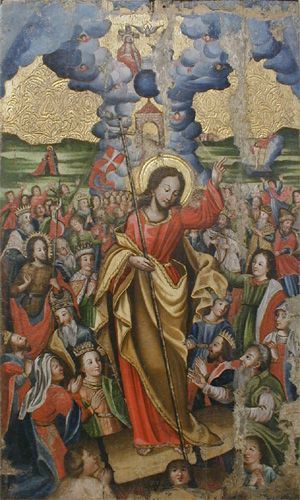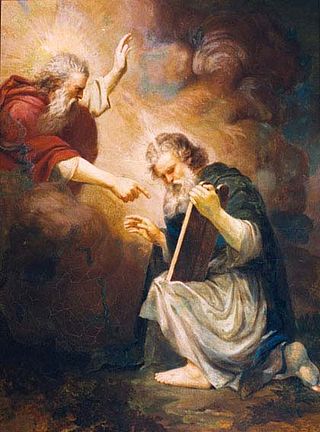
Holy Week is the most sacred week in the liturgical year in Christianity. For all Christian traditions it is a moveable observance. In Eastern Christianity, which also calls it Great Week, it is the week following Great Lent and Lazarus Saturday, starting on the evening of Palm Sunday and concluding on the evening of Great Saturday. In Western Christianity, Holy Week is the sixth and last week of Lent, beginning with Palm Sunday and concluding on Holy Saturday.

Confession, in many religions, is the acknowledgment of one's wrong thoughts and actions (sins). This may occur directly to a god, to fellow people, or to a person acting as a mediator for a god.

Penance is any act or a set of actions done out of repentance for sins committed, as well as an alternate name for the Catholic, Lutheran, Eastern Orthodox, and Oriental Orthodox sacrament of Reconciliation or Confession. It also plays a part in confession among Anglicans and Methodists, in which it is a rite, as well as among other Protestants. The word penance derives from Old French and Latin paenitentia, both of which derive from the same root meaning repentance, the desire to be forgiven. Penance and repentance, similar in their derivation and original sense, have come to symbolize conflicting views of the essence of repentance, arising from the controversy as to the respective merits of "faith" and "good works". Word derivations occur in many languages.
In the Catholic Church, holy days of obligation are days on which the faithful are expected to attend Mass, and engage in rest from work and recreation, according to the fourth commandment.

Eastertide or Paschaltide is a festal season in the liturgical year of Christianity that focuses on celebrating the Resurrection of Jesus Christ. Preceded by Lent, it begins on Easter Sunday, which initiates Easter Week in Western Christianity, and Bright Week in Eastern Christianity.

A sacramental is a sacred sign, a ritual act or a ceremony, which, in a certain imitation of the sacraments, has a spiritual effect and is obtained through the intercession of the Church. Sacramentals surround the sacraments like a wreath and extend them into the everyday life of Christians. Sacramentals are recognised by the Roman Catholic Church, the Eastern Orthodox Church, the Oriental Orthodox Churches, the Church of the East, the Lutheran churches, the Old Catholic Church, the Anglican churches, Independent Catholic churches, and Methodist churches.
In the Catholic Church, the Seal of Confession is the absolute duty of priests or anyone who happens to hear a confession not to disclose anything that they learn from penitents during the course of the Sacrament of Penance (confession). Even where the seal of confession does not strictly apply – where there is no specific serious sin confessed for the purpose of receiving absolution – priests have a serious obligation not to cause scandal by the way they speak.

Eucharistic discipline is the term applied to the regulations and practices associated with an individual preparing for the reception of the Eucharist. Different Christian traditions require varying degrees of preparation, which may include a period of fasting, prayer, repentance, and confession.

The Ten Commandments, or the Decalogue, are a set of biblical principles relating to ethics and worship that play a fundamental role in Judaism, Christianity, and Islam. The text of the Ten Commandments appears twice in the Hebrew Bible: at Exodus 20:2–17 and Deuteronomy 5:6–21.
The Paschal mystery is one of the central concepts of Catholic faith relating to the history of salvation. According to the Compendium of the Catechism of the Catholic Church, "The Paschal Mystery of Jesus, which comprises his passion, death, resurrection, and glorification, stands at the center of the Christian faith because God's saving plan was accomplished once for all by the redemptive death of himself as Jesus Christ." The Catechism states that in the liturgy of the Church "it is principally his own Paschal mystery that Christ signifies and makes present."

Eucharist is the name that Catholics give to the sacrament by which, according to their belief, the body and blood of Christ are present in the bread and wine that are consecrated during the Catholic eucharistic liturgy, generally known as the Mass. The definition of the Eucharist in the 1983 Code of Canon Law as the sacrament where Christ himself "is contained, offered, and received" points to the three aspects of the Eucharist according to Catholic theology: the real presence of Christ in the Eucharist, Holy Communion, and the holy sacrifice of the Mass.
The Sacrament of Penance is one of the seven sacraments of the Catholic Church, in which the faithful are absolved from sins committed after baptism and reconciled with the Christian community. During reconciliation mortal sins must be confessed and venial sins may be confessed for devotional reasons. According to the dogma and unchanging practice of the church, only those ordained as priests may grant absolution.

The Mass is the central liturgical service of the Eucharist in the Catholic Church, in which bread and wine are consecrated and become the body and blood of Christ. As defined by the Church at the Council of Trent, in the Mass "the same Christ who offered himself once in a bloody manner on the altar of the cross, is present and offered in an unbloody manner". The Church describes the Mass as the "source and summit of the Christian life", and teaches that the Mass is a sacrifice, in which the sacramental bread and wine, through consecration by an ordained priest, become the sacrificial body, blood, soul, and divinity of Christ as the sacrifice on Calvary made truly present once again on the altar. The Catholic Church permits only baptised members in the state of grace to receive Christ in the Eucharist.

In the Catholic Church, the anointing of the sick, also known as Extreme Unction, is a Catholic sacrament that is administered to a Catholic "who, having reached the age of reason, begins to be in danger due to sickness or old age", except in the case of those who "persevere obstinately in manifest grave sin". Proximate danger of death, the occasion for the administration of Viaticum, is not required, but only the onset of a medical condition of serious illness or injury or simply old age: "It is not a sacrament for those only who are at the point of death. Hence, as soon as anyone of the faithful begins to be in danger of death from sickness or old age, the fitting time for him to receive this sacrament has certainly already arrived."

Lent is the solemn Christian religious observance in the liturgical year commemorating the 40 days Jesus Christ spent fasting in the desert and enduring temptation by Satan, according to the Gospels of Matthew, Mark and Luke, before beginning his public ministry. Lent is observed in the Anglican, Eastern Orthodox, Lutheran, Methodist, Moravian, Oriental Orthodox, Church of the East, United Protestant and Roman Catholic traditions of Christianity. Some Anabaptist, Baptist, Reformed, and nondenominational Christian churches also observe Lent, although many churches in these traditions do not.

The Ten Commandments are series of religious and moral imperatives that are recognized as a moral foundation in several of the Abrahamic religions, including the Catholic Church. As described in the Old Testament books Exodus and Deuteronomy, the Commandments form part of a covenant offered by God to the Israelites to free them from the spiritual slavery of sin. According to the Catechism of the Catholic Church—the official exposition of the Catholic Church's Christian beliefs—the Commandments are considered essential for spiritual good health and growth, and serve as the basis for Catholic social teaching. A review of the Commandments is one of the most common types of examination of conscience used by Catholics before receiving the sacrament of Penance.
Canon 915, one of the canons in the 1983 Code of Canon Law of the Latin Church of the Catholic Church, forbids the administration of Holy Communion to those upon whom the penalty of excommunication or interdict has been imposed or declared, or who obstinately persist in manifest grave sin:
Those who have been excommunicated or interdicted after the imposition or declaration of the penalty and others obstinately persevering in manifest grave sin are not to be admitted to holy communion.
The Lutheran sacraments are "sacred acts of divine institution". Lutherans believe that, whenever they are properly administered by the use of the physical component commanded by God along with the divine words of institution, God is, in a way specific to each sacrament, present with the Word and physical component. They teach that God earnestly offers to all who receive the sacrament forgiveness of sins and eternal salvation. They teach that God also works in the recipients to get them to accept these blessings and to increase the assurance of their possession.

There are seven sacraments of the Catholic Church, which according to Catholic theology were instituted by Jesus Christ and entrusted to the Church. Sacraments are visible rites seen as signs and efficacious channels of the grace of God to all those who receive them with the proper disposition.













